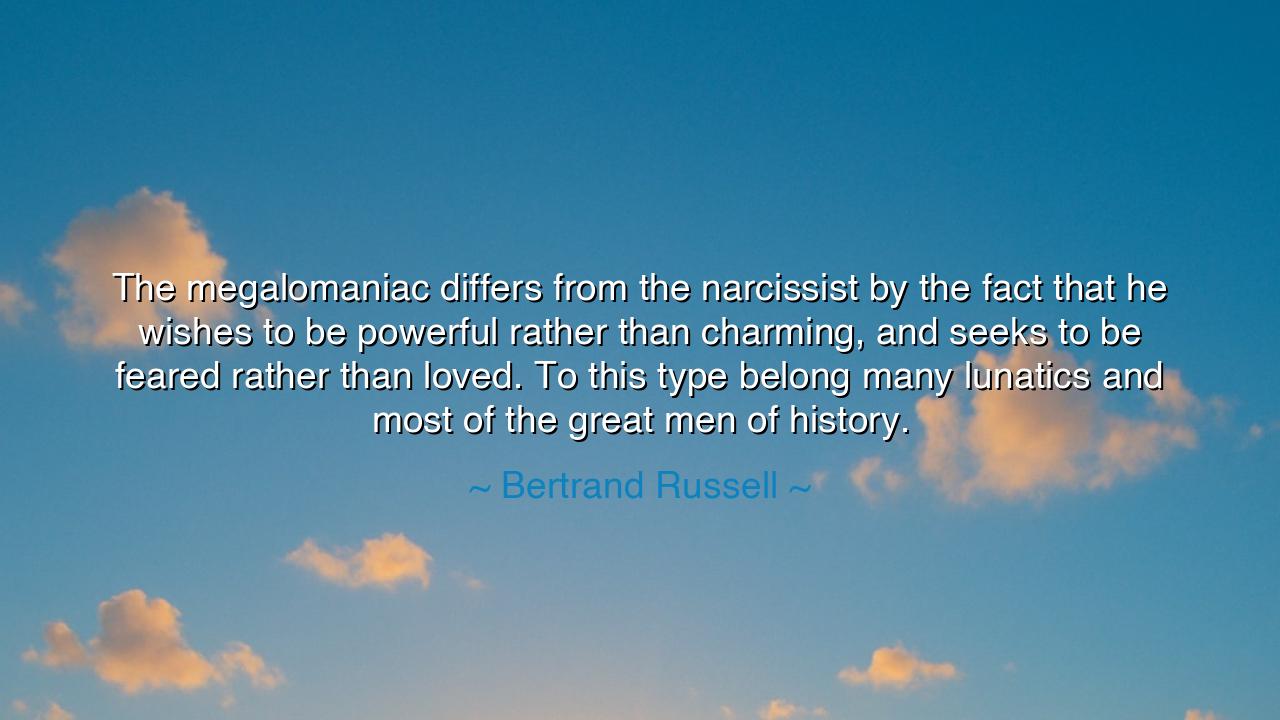
The megalomaniac differs from the narcissist by the fact that he
The megalomaniac differs from the narcissist by the fact that he wishes to be powerful rather than charming, and seeks to be feared rather than loved. To this type belong many lunatics and most of the great men of history.






"The megalomaniac differs from the narcissist by the fact that he wishes to be powerful rather than charming, and seeks to be feared rather than loved. To this type belong many lunatics and most of the great men of history." — Bertrand Russell
In this piercing reflection, Bertrand Russell, philosopher of the modern age, unveils one of the oldest truths about the human soul: that the hunger for power can disguise itself as greatness, and that history often crowns both its heroes and its tyrants from the same mold. The megalomaniac, he says, differs from the narcissist — for the narcissist desires admiration, while the megalomaniac demands dominion. The one seeks to be adored; the other, to rule. Yet both are ensnared by the same shadow — the need to place oneself above all others.
Russell, born amid the collapse of empires and the rise of ideologies, watched the twentieth century ignite with the fury of men who thought themselves gods. He saw how megalomania, dressed in the robes of vision, could inspire nations to both creation and catastrophe. The megalomaniac does not merely crave wealth or beauty; he yearns to bend the world to his will. To such a man, love is too small a prize, for he seeks not affection but obedience — not hearts, but histories.
So it has been since time immemorial. Consider Alexander the Great, whose ambition knew no horizon. He conquered lands from Greece to India, uniting worlds under his banner, and yet found no peace within himself. When there were no more lands to conquer, he wept — for his hunger was endless. He was both a genius of strategy and a slave to his own megalomania. The same fire that built his empire consumed his soul. And yet, in the paradox Russell observes, it is this same fire that often forges the "great men of history" — those who change the world, for better or worse.
The line between greatness and madness is thin, drawn in trembling sand. The megalomaniac may raise monuments that stand for centuries, but he also leaves behind the ruins of his arrogance. Think of Napoleon Bonaparte, who rose from obscurity to command the fate of Europe. His genius reshaped nations, his laws endure to this day, and yet his pride led him to destruction. He sought to be feared rather than loved, and though he carved his name into eternity, he did so upon the graves of millions. Such is the price of the unrestrained will — that in reaching for immortality, one forgets humanity.
And yet, Russell does not speak only of kings and conquerors. The megalomaniac spirit may dwell in any man — the leader who craves control, the thinker who would rather be right than kind, the reformer who loves his vision more than the people it was meant to serve. To wish for greatness is no sin, but to desire power for its own sake is to fall into darkness. The wise seek mastery over themselves; the fool seeks mastery over others. The world remembers both — but only one leaves peace in his wake.
Thus, the philosopher’s words are both warning and revelation. Power, like fire, can illuminate or destroy. To wield it wisely, one must temper ambition with compassion, and strength with humility. Let not your desire to be mighty consume your capacity to be good. If you would lead, lead to serve; if you would build, build not for glory, but for truth. For every Alexander there must also be an Asoka, the emperor who, after conquest, turned to peace and wisdom — who found that ruling the self is greater than ruling the world.
So, my child, hear this and remember: to be feared is easy, but to be respected is divine. The megalomaniac leaves monuments of stone; the wise leave monuments of spirit. Seek not to stand above men, but among them — to guide, not to command. For the greatness that endures is not that of domination, but of harmony. In mastering your own will, you become greater than any conqueror; in choosing compassion over control, you transcend the madness that has undone so many of the “great men of history.”






AAdministratorAdministrator
Welcome, honored guests. Please leave a comment, we will respond soon